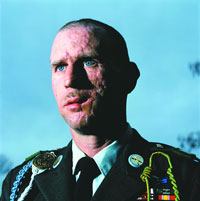VOLUME 3, ISSUE 344 | October 28 – November 3, 2004
NEWS
It’s the War, Stupid
America’s Debt to Its Troops Comes Due November 2
This past Saturday I was in the green room in the Reuters television studio overlooking Times Square, waiting with others to appear on the Dutch equivalent of “Nightline,” and it felt like my heart was going to explode. I was staring at Cathy Heighter. Her 21-year-old son Raheen, an Army private, was killed when a convoy in which he was riding outside Baghdad was attacked. Sitting across the room from Heighter was Ivan Medina, a 23-year-old veteran who served in Iraq. His twin brother, Irving, an Army specialist, was killed in Baghdad when his convoy struck an improvised explosive device. I tried to envision their sense of loss. Medina, a co-founder of Iraq Veterans Against the War, handed me a business card that had on it his brother’s photograph and an American flag. Heighter offered me a magnet bearing the image of her son and the address for a scholarship fund created to honor him. It was not possible to fathom fully their bottomless grief.
In the room and the adjoining hallway, other guests milled. I spotted Dan Senor, the former spokesman for the U.S. authority in Iraq. There was a Republican lawyer who spins for the White House. There was a member of the anti-Kerry Swift Boat Vets outfit that was spending millions of dollars on attack ads against John Kerry in order to keep George W. Bush in office. All in one setting: the victims of George Bush and Bush’s lieutenants—there to discuss calmly and reasonably the war in Iraq and the upcoming U.S. election. I wanted to scream.
Before me was one price of Bush’s war in Iraq—or 0.18 percent of it. I did the math, multiplying the suffering in this room by the tens of thousands of relatives and friends of Americans whose lives ended too early in Iraq. I added in the pain and misery of those wounded in Iraq and their families. And none of this included the suffering on the Iraqi side. In terms of past wars, the number of killed and wounded U.S. troops in Iraq has not loomed large, but the collective grief I was imagining seemed overwhelming.
If Bush had been in the room, I would have had the strong urge to throttle him and ask, “Was it absolutely, 100 percent, without any doubt, necessary for these people to lose their loved ones?” Before the invasion, Bush said the primary reason for war was to address the “direct,” “immediate” and “gathering” threat Saddam Hussein’s regime presented. And Iraq was such a threat, Bush asserted, because it possessed biological and chemical weapons and a revived nuclear weapons program and because it was “dealing” with Al Qaeda. None of that has proven true. The Duelfer report concludes that Hussein had neither WMDs nor any active WMD programs (and that Hussein’s WMD programs were in a state of decay—that is, de-gathering). The 9/11 Commission and the CIA found no evidence of an operational relationship between Hussein’s government and Al Qaeda. There was no pressing threat that required a war. There was plenty of time to pursue other options. In fact, the inspections and sanctions had worked. These days, Bush hails the war in Iraq as an essential part of an overall crusade to bring democracy and freedom to the Middle East. But that is not how he sold the invasion originally. The main reason for which those two men—and others—have died was bunk. Bush failed the most solemn obligation of his office: to order men and women to their death for good cause and only if there is no other choice.
I confess: I find it increasingly difficult to be civil about this. I certainly can argue politely and passionately with conservatives about welfare reform, school choice, faith-based initiatives, tax cuts, antiballistic missile defense. I can see how people of good faith might disagree in good faith over these contentious issues. But I am losing my patience with anyone who refuses to acknowledge that Raheen Heighter, Irving Medina and many others died under George Bush’s false pretenses. And given that the war in Iraq was indeed an elective war, I want to grab advocates of the war by the lapel and say, “Unless you’re willing to put your butt—or that of a precious son or daughter—in an unreinforced Humvee in Iraq, why should anyone die for your and Bush’s assertion that the war in Iraq is essential for America’s safety?”
What compounds the ill will I feel for Bush and the war-backers is the manner in which Bush discusses the war while campaigning. Rather than strive for a high-minded and somber debate about the most critical issue of the campaign, he has resorted to cheap shots and derision. He blasts Kerry for advocating “pessimism and retreat” and for considering terrorism a “nuisance,” when Kerry merely said is that it would be desirable to reach a day when terrorism is nothing more than a “nuisance.” (That sounds like a decent goal, particularly when Bush says, “Whether or not we can be ever fully safe is—you know—is up in the air.”) Bush claims Kerry would submit U.S. national security decisions to other nations for a veto. At a campaign rally on Monday, he declared that Kerry “believes that instead of leading with confidence, America must submit to what he calls a global test. I’m not making that up… That means our country must get permission from foreign capitals before we act in our own self-defense.” That is not what Kerry has said. He has explicitly stated he would not allow other governments to block actions he deemed necessary. But he did say that if a U.S. president orders a pre-emptive strike, he ought to do so for a reason that is compelling enough to convince the American public and people abroad. Bush responds to that with mockery based on a falsehood.
Bush has belittled any discussion of the war that is not black and white. For example, he attacked Kerry foreign policy adviser Richard Holbrooke, a former UN ambassador, for saying “We’re not in a war on terror in a literal sense” and for calling the so-called war on terrorism a “metaphor” like the war on poverty. “Confusing food programs with terrorist killings reveals a fundamental misunderstanding of the war we face,” Bush exclaimed, “And that is very dangerous thinking.” This is not serious debate about a serious matter: the war in Iraq and the best way to counter the threat of Islamic jihadism. This is a shallow-minded Bush putting politics over all else. Accusing Holbrooke of not knowing the difference between “food programs” and “terrorist killings”—there is a word for that: stupid.
Worse, Bush refuses to acknowledge he sold the war with false information. Even after the Duelfer report was released, Bush insisted Hussein had been a “gathering” threat. And if the mission in Iraq was, as Bush now describes it, “to help Iraq become a free nation in the midst of the greater Middle East,” why did he have to invade Iraq on March 19, 2003—before the inspections process was done, before more of the United States’ major allies were recruited for the coalition, before the U.S. troops were fully equipped with body armor and reinforced Humvees, before plans were readied for the post-invasion period and the economic, social, legal, political and security challenges to come?
Bush has not been honest about this war. That means he has not been honest about the immense loss suffered by Cathy Heighter, by Ivan Medina and by thousands of other Americans. What an insult. And those who stand with Bush share in the deceit. They are the masters of war who force others to be their servants of sacrifice. And I appear with them in television studios so we can debate the finer points of the latest developments in Iraq and the so-called war on terrorism. I am not sure if I hate them. But I do despise what they have wrought and what they defend. And I do want to shout—I mean really shout—at them for supporting and enabling the callous miscalculations of a reckless and disingenuous president. But that would make for bad and ineffective television. So I sit politely and wait to have my say, as do Heighter and Medina, and hope that somewhere, somehow, sometime (perhaps even this coming Tuesday) what we say rather than scream—as well as what Heighter and Medina feel—will matter.
This article first appeared in Tom Pain.com, where David Corn writes “The Loyal Opposition” twice a month. Corn is also the Washington editor of The Nation and is the author of “The Lies of George W. Bush: Mastering the Politics of Deception” (Crown Publishers).




































